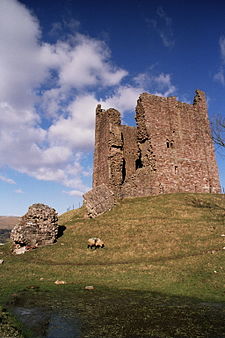Kad smo već kod srpske reči
grad, dodaćemo napomenu da Germani imaju još jednu reč za grad, a to je reč burg, "as in" Sankt Peterburg ili Zalcburg... ili kao u pesmi Skarboro fer i sl. Ne znam da li je zaista germanska reč u pitanju ili su je Germani ćornuli Keltima, "yet" Irci imaju jedno selo odakle potiče jedan lepi beli kultivarni narcis, a zove se Šejnov Grad ili "Brug Šejn":
na engleskom: Broughshane
na škotskom:
Brochshane[1]
na irskom:
Bruach Sheáin
Pogledajte prilog 1124942
I sad se pitam ko je napravio metatezu likvide R - Germani ili Kelti (ovde imamo Irce i Škote kao predstavnike potomnjih). Kako bilo ("whatever the answer") činjenica je da Kelti izgovaraju kao Sloveni (Južni i dobar deo Zapadnih). A Nemci, ko nemi, gledaju da olakšaju prvonaglasni suglasnički klaster...
Pogledaću da li u irskom, škotskom i velškom postoje slične metatezne situacije koje korespondiraju sa srpskim rasporedom konsonanta kad su u pitanju prvonaglasni suglasnički klasteri koji sadrže likvidu R ili L...
Camelot Warriors - Scarborough Fair
borough (n.)
Old English burg, burh "a dwelling or dwellings within a fortified enclosure," from Proto-Germanic *burgs "hill fort, fortress" (source also of Old Frisian burich "castle, city," Old Norse borg "wall, castle," Old High German burg, buruc "fortified place, citadel," German Burg "castle," Gothic baurgs "city"), which Watkins derives from from PIE root
*bhergh- (2) "high," with derivatives referring to hills, hill forts, and fortified elevations.
In German and Old Norse, chiefly as "fortress, castle;" in Gothic, "town, civic community." Meaning shifted in Old English from "fortress," to "fortified town," then simply "town" (16c., especially one possessing municipal organization or sending representatives to Parliament). In some U.S. states (originally Pennsylvania, 1718) often an incorporated town; in Alaska, however, it is the equivalent of a county. As one of the five administrative divisions of New York City, it dates from the consolidation of 1898; in London, its use dates from the London Government Act of 1899.
The Scottish form is burgh. The Old English dative singular byrig survives in many place names as -bury.


 Оплаках!
Оплаках! 





